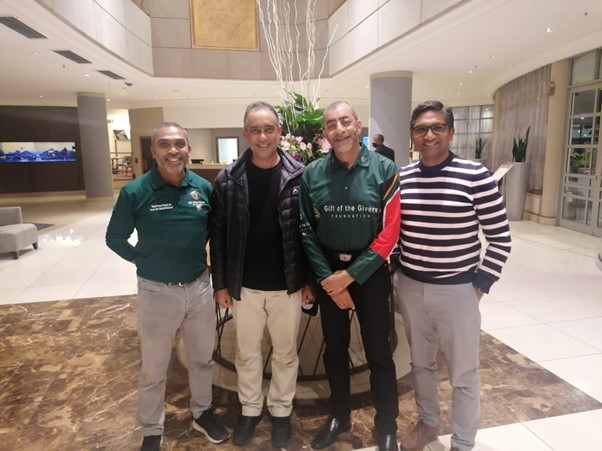World Kidney Day is observed annually on the 2nd Thursday in March (on the 9th in 2023). In an opinion piece for News24, Dr Yazied Chothia (Tygerberg Hospital and the Division of Nephrology) emphasises the importance of bridging the dialysis gap because the cost of dialysis is exorbitant and can be as high as R450,000 per patient per year in our public health sector.
- Read the article below or click here for the piece as published.
Yazied Chothia*
World Kidney Day is observed annually on the 2nd Thursday in March (on the 9th in 2023). It is estimated that more than 850 million people have chronic kidney disease (CKD) worldwide, meaning 1 in 10 persons have some form of CKD. According to the World Health Organisation, kidney disease is currently the 10th leading cause of death globally.
As a result of the high burden of HIV as well as the increasing prevalence of non-communicable diseases such as hypertension (high blood pressure) and diabetes in Africa, it is anticipated that there will be a parallel rise in the burden of CKD on the continent.
Treatment of advanced stages of CKD, referred to as kidney replacement therapy (KRT), includes haemodialysis, peritoneal dialysis and kidney transplantation. In haemodialysis, blood is pumped out of the patient's body to an artificial kidney machine and returned to the body by tubes that connect the patient to the machine. In peritoneal dialysis, the inside lining of the abdomen acts as a natural filter.
The cost of dialysis is exorbitant and can be as high as R450,000 per patient per year in our public health sector. Consequently, since 85% of people living in South Africa depend on the public sector for healthcare, treatment must be rationed because of resource constraints. In 2017, we reported that only 1 of 4 patients are offered KRT at Tygerberg Hospital, and this is only expected to worsen because of the anticipated rise in the burden of patients with CKD.
South Africa is severely underperforming with regard to KRT treatment rates. The 2020 annual report of the South African Renal Registry found a KRT treatment rate of only 44 per million population (pmp) in the public sector. This is less than the approximately 70 pmp that was reported nearly three decades ago in 1994. However, in the private health sector the treatment rate was 729 pmp, which was comparable to wealthier countries. This shows that in South Africa, KRT is only available to those who can afford it.
Overall, our treatment rate of 147 pmp (private and public sector) is much lower compared to countries with similar gross national products per capita such as Colombia at 840 pmp. According to the United States Renal Data System 2020 report, only 11 new kidney failure patients per million population are started on KRT annually in South Africa, the lowest rate of all countries submitting data, mostly within the private sector.
From 2017 to 2020, a concerned member of the community noticed that kidney disease did not receive as much attention as diseases such as cancer and wanted to increase awareness within the community. Funds were raised at annual events to assist a few patients who could not be offered KRT at Tygerberg Hospital. Patients who could afford a low-cost medical aid were supported with 'bridging' dialysis. The term 'bridging' refers to the dialysis support provided to patients during the one-year exclusion period prior to their medical aids fully covering KRT.
During this 'bridging' period, patients receive two dialysis sessions weekly for one year at a reduced rate while all other care such as chronic medication, vascular access (maintaining blood vessel access necessary to perform dialysis) and routine blood tests are continued at Tygerberg Hospital. A total of 11 patients were bridged during this period; however, support had to be discontinued in 2020 because of the COVID-19 pandemic.
In May 2022 the programme was revived after the Division of Nephrology at Tygerberg Hospital and Stellenbosch University teamed up with Gift of the Givers who donated R1.2 million toward the programme. Since Tygerberg Hospital's dialysis unit could not accommodate additional patients because of limited capacity and staff, we approached the private sector who jumped at the opportunity to assist. Currently, we are supporting 17 patients at two dialysis centres in Cape Town — the B Braun Dialysis Centre at Cape Gate Mediclinic and the Dialysis Unit at Life Vincent Pallotti Hospital. We are hopeful that other private dialysis service providers and hospitals will join our programme so that we can assist many more patients.
In conclusion, the treatment rate of KRT in South Africa's public health sector has remained unchanged for nearly three decades despite the growing burden of disease. More resources are needed at all levels of the healthcare system to screen patients at high risk of CKD, and to identify and treat CKD patients at earlier stages of the disease to prevent progression to kidney failure. Until this happens, patients will continue to present late, which is unfortunately a death sentence for most patients who depends on the public health sector. In the meantime, we are grateful to organisations such as the Gift of the Givers for coming to the rescue of our patients at a time when they are at their most vulnerable.
*Dr Yazied Chothia is a nephrologist and senior lecturer in the Division of Nephrology at the Faculty of Medicine and Health Sciences at Stellenbosch University.
- Main photo: Dialysis machines. Credit: Wikimedia Commons
- Photo 1: Dr Yazied Chothia (far right) at a meeting with Gift of the Givers in May 2020 at the Southern Sun Hotel in Cape Town together with Dr Naeem Kathrada (Head of the Western Cape branch of the medical division and team leader for Gift of the Givers), Professor Razeen Davids (Head of the Division of Nephrology at Tygerberg Hospital and Stellenbosch University), and Dr Imtiaz Sooliman (Founder of Gift of the Givers).

